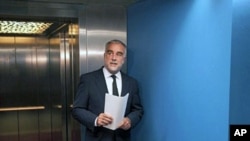In asking for the arrest warrants, Prosecutor Luis Moreno-Ocampo said the evidence is clear: Moammar Gadhafi personally ordered the attacks on unarmed civilians that have been taking place since the uprising began in mid-February.
"He committed crimes with the goal of preserving authority. He has absolute authority. He uses that authority to commit crimes," said Ocampo.
Prosecutor Moreno-Ocampo said Mr. Gadhafi ruled through fear, that his security forces opened fire onto demonstrators, used heavy artillery on funeral processions, and used snipers to shoot worshippers leaving mosques.
But Mr. Gadhafi, on his way to deliver a speech to his supporters in Tripoli, refuted the charges, saying there were absolutely no protests in Libya, and no firing on protesters because armed gangs related to Al-Qaida do not appear on streets and do not make protests.
The prosecutor said Colonel Gadhafi couldn’t do it without the help of what he called the colonel’s inner circle: his second oldest son, Saif al-Islam Gadhafi, who he called the de facto prime minister. And his brother-in-law, Abdullah al-Sanousi, his right-hand man and head of Libya’s military intelligence. The prosecutor says he has evidence that the three men held meetings to plan the attacks.
Prosecutors have had a lot of help in their two-month long Libya investigation - the court’s quickest to date.
The international police agency Interpol and Libyans who have left the country have all provided evidence.
Prosecutors say they’ve interviewed 50 people - including insiders and eyewitnesses - and have reviewed about 1,200 documents, and are almost ready for trial. But first, judges will have to decide whether or not there’s enough evidence to issue the arrest warrants. They have three months to do that. And then, if granted, it will be up to Libyan authorities to turn the men over to The Hague.
Because the U.N. Security Council ordered the ICC investigation, all U.N. member states would be obliged to arrest him if he ventures into their territory.
War Crimes Prosecutors Seek Gadhafi's Arrest
